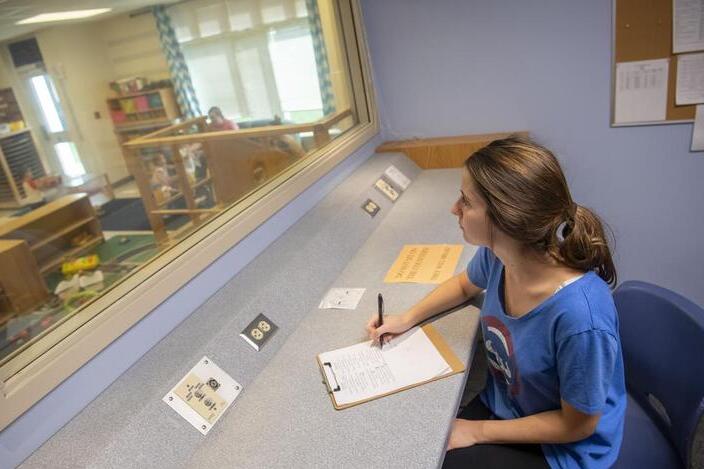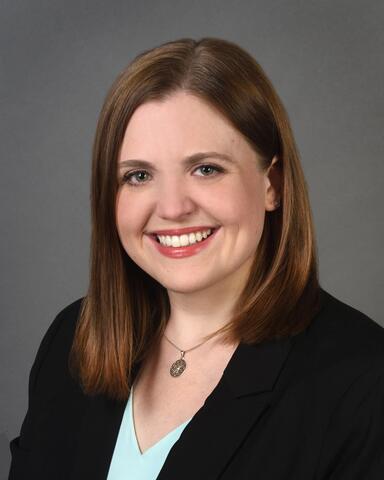Child Development Lab at Illinois provides child care, guides careers

It was at the University of Illinois Urbana-Champaign that alumna Meagan Roloff discovered a calling that would lead to her dream career as Director of Member Services and Engagement with the National Association for Gifted Children. Roloff’s student research experience at the university’s Child Development Laboratory (CDL) changed not only the course of her academic path but also her life.
“My original goal was to become a classical musician, but that was a very competitive path, and to be perfectly honest, it led to a mental health crisis for me. I went home during my junior year and spent a lot of time thinking about everything I had studied up to this point, figuring out what truly made me feel good,” said Roloff, a Certified Association Executive (CAE) and Certified Child Life Specialist (CCLS). “I realized I was at my best when I was working with kids, something I had done even before college.”

Roloff decided to pursue a human development and family studies (HDFS) major and soon started conducting developmental assessments and assisting in the classroom at the CDL, part of HDFS and the College of Agricultural, Consumer and Environmental Sciences (ACES) at Illinois.
The CDL supports teaching, research, outreach, and engagement activities, while also providing high-quality care and education to enrolled children (from birth through preschool) and their families. Academic units across campus bring classes to the CDL, where students witness child behavior in real-time from within its classrooms and observation booths. Many classes, independent study projects, and graduate and faculty studies also involve research with CDL kids.
As a part of day-to-day operations at the CDL, Roloff focused on developmental assessments, engaging one-on-one with kids to determine whether they were meeting standard milestones.
“I really jumped at the opportunity to work at the CDL. Those experiences helped me understand my studies more and helped me to build meaningful skills I’ve used in my career,” Roloff said. “The CDL is an invaluable resource, and it has a positive impact on so many levels. It’s wonderful for the faculty who are conducting research, but it is just as wonderful for those going out into the world with a foundation of what high-quality early childhood education programming looks like and spreading that to other places.”
After graduating in 2011, Roloff started her career as a certified child life specialist, working directly with pediatric patients and their families. She also spent time running children’s programming at a non-profit cancer support center.
“In that time, I realized that while I was a good child life specialist, my talents were more suited to doing big picture, behind-the-scenes work,” Roloff said. “When I was working in a hospital, seeing 10 to 12 patients a day, my work had a positive impact on those families, but by working in associations, my role really changed. By supporting this field of professionals and making their jobs easier by finding the resources, community, and education they need to operate, I am creating a much bigger impact for those I want to help.”
Roloff recently took on a new role as vocational director for HDFS on the ACES Alumni Board in January 2024. While staying connected to the college she loves, Roloff said that her experiences on the board have also helped her better understand just how human development and family studies fit into the College of ACES in the first place.
“Getting to know more about the programs that I participated in as a student, and learning how they fit together, I can see the bigger picture here at ACES. It’s exciting to get that new perspective on it,” Rollof said.
In her role on the board, Roloff serves as a resource for the HDFS department and for current students envisioning their future in the field.
“As for future HDFS students, I can’t recommend this field of study enough,” she said. “You learn a lot about yourself, your own family, and the systems that make you who you are. People become complex but beautiful puzzles.”
As an integral part of an HDFS education, CDL helps develop those beautiful puzzles — both in the children it cares for and the students who train there. Unfortunately, the building that houses the preschool classrooms for the CDL is no longer up to the task. A capital campaign is seeking donations to build a new, modern facility — which will be an expansion of the Early Childhood Development Facility built in 2003 — to do justice to the lasting impact of the CDL.
“By investing in the CDL, you’re investing in the future and in the betterment of society,” Roloff said. “It’s making sure the generation coming up behind us is starting off on a better foot than we did. I think that’s the goal, right?”
Contributions to the building project can be made online to the “Child Development Laboratory Fund.” Contact the Office of Advancement at 217-333-9355 or acesadvancement@illinois.edu to discuss naming opportunities and other giving opportunities to support the CDL’s mission.